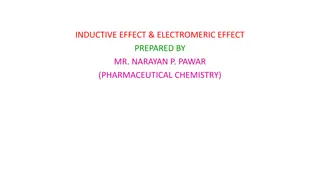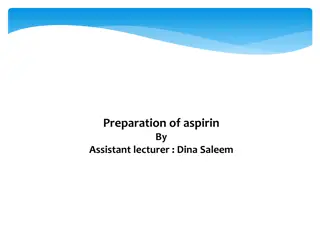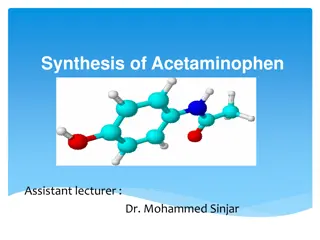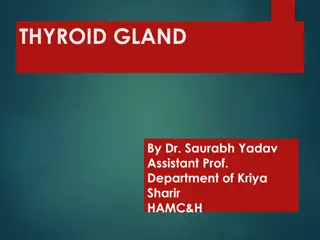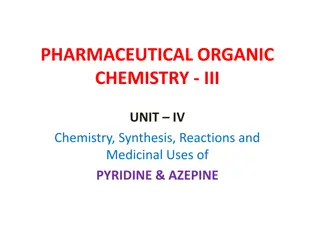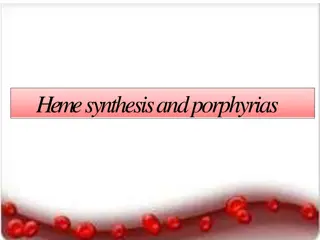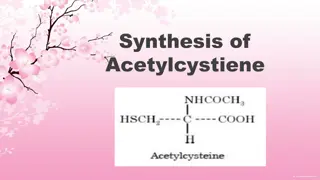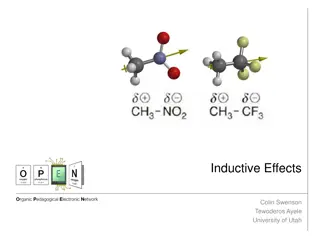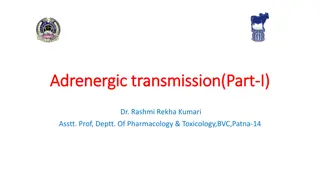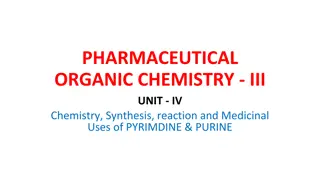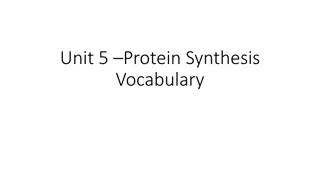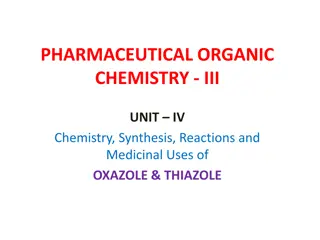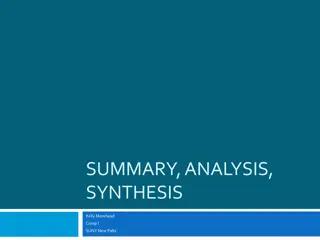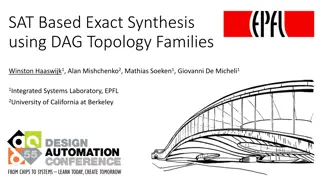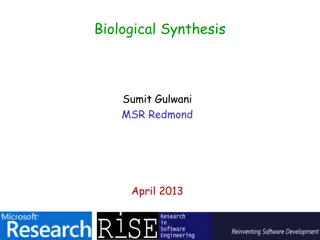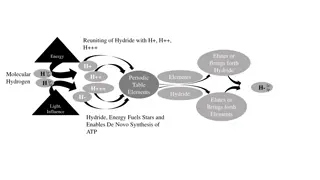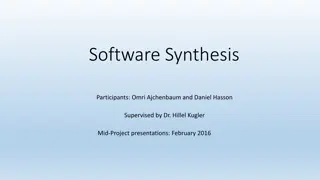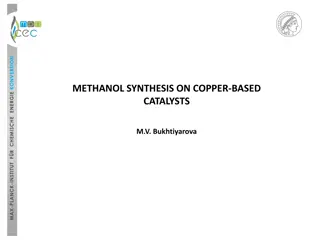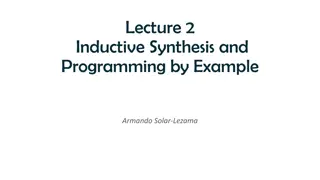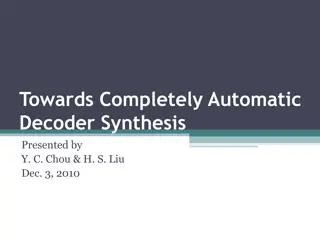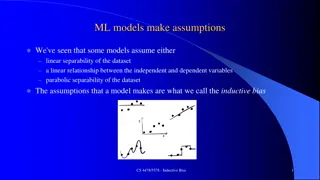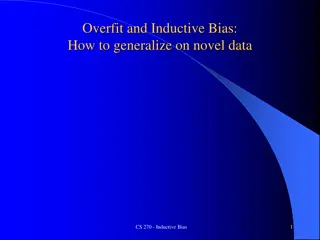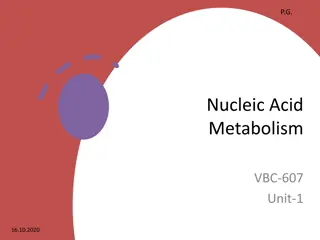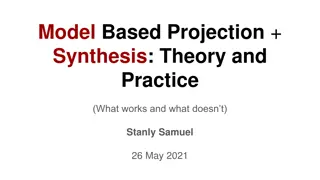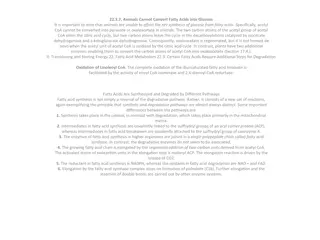Understanding Inductive and Deductive Reasoning
Inductive reasoning involves drawing general conclusions from specific observations, while deductive reasoning starts with general premises to derive specific conclusions. Induction uses experience or experimental evidence to make broad conclusions, while deduction follows from general to specific.
5 views • 7 slides
Understanding the Inductive and Electromeric Effects in Organic Chemistry
The inductive effect in organic chemistry is the polarization of a bond due to electron-donating or withdrawing effects of adjacent groups, leading to a degree of polarity in the bond. This effect is distance-dependent and can be either electron-withdrawing or electron-releasing. On the other hand,
0 views • 12 slides
Preparation of Aspirin: Overview and Synthesis Methods
The preparation of aspirin involves the synthesis of 2-acetyl salicylic acid, known for its therapeutic uses as an analgesic, antipyretic, and anti-inflammatory agent. This process includes the detailed characteristics, stability, mechanism, and synthesis methods of aspirin. Important considerations
0 views • 12 slides
Acetaminophen Synthesis Process Explained
Acetaminophen, also known as paracetamol, is a widely used analgesic and fever-reducing medicine. The synthesis of acetaminophen involves treating an amine with an acid anhydride to form an amide. This process includes mixing reactants, isolating crude acetaminophen, and purifying the final product.
0 views • 17 slides
Understanding the Thyroid Gland: Functions and Hormone Synthesis
The thyroid gland is a vital endocrine gland located below the larynx, responsible for producing thyroid hormones essential for regulating metabolism. This gland consists of follicles lined with follicular cells, producing thyroglobulin and thyroid hormones T3 and T4. Iodine plays a crucial role in
0 views • 40 slides
Chemistry, Synthesis, Reactions, and Medicinal Uses of Pyridine & Azepine
Explore the fascinating world of pharmaceutical organic chemistry with a focus on Pyridine and Azepine. Learn about the chemistry, synthesis, reactions, and medicinal applications of these important compounds through a series of informative slides. Delve into the structural characteristics, synthesi
2 views • 23 slides
Overview of Heme Synthesis and Porphyrias
Heme is a crucial component present in various essential proteins in the body, such as hemoglobin, myoglobin, and cytochromes. The synthesis of heme takes place in multiple steps involving different organelles and enzymes in the cell. Porphyrias are a group of disorders related to heme synthesis, ch
0 views • 44 slides
Synthesis of Acetylcysteine: Procedure, Uses, and Precautions
The synthesis of acetylcysteine involves acetylating L-Cysteine in the presence of acetic anhydride and sulfuric acid. Acetylcysteine has various uses, including reducing pulmonary secretions' viscosity, being an antidote for acetaminophen overdose, and chelating heavy metals. The procedure, precaut
0 views • 20 slides
Endocrinological Aspects of Pregnancy: Hormones, Functions, and Synthesis
During pregnancy, endocrinological structures like the corpus luteum and placenta play vital roles in the production of hormones such as progesterone and estrogens. Progesterone maintains pregnancy by controlling essential functions like endometrial differentiation, myometrial quiescence, and local
4 views • 15 slides
Mechanism of Action of Antifolate Drugs in Bacterial Synthesis
Folate-derived cofactors are crucial for cell growth, with bacteria relying on de novo synthesis while humans need preformed folate. Antifolates like sulfonamides and trimethoprim disrupt folate synthesis in bacteria, inhibiting DNA synthesis. This article explores how these drugs target bacterial e
0 views • 34 slides
Understanding Inductive Effects in Organic Chemistry
Inductive effects play a crucial role in the reactivity and properties of organic molecules. This phenomenon involves the withdrawal or donation of electron density due to differences in electronegativity, impacting acidity, stability, and interactions with other molecules. Explore how inductive eff
0 views • 7 slides
Understanding Hemoglobin: Synthesis, Functions, and Influence on Anemia
Hemoglobin is a vital protein in red blood cells responsible for oxygen transport. Its synthesis, influenced by factors like erythropoietin, vitamins, and trace metals, plays a crucial role in maintaining proper oxygen levels in the body. An insight into hemoglobin's structure, synthesis, and impact
1 views • 19 slides
Understanding Adrenergic Transmission and Catecholamine Synthesis
Adrenergic transmission involves the release of neurotransmitters such as norepinephrine, dopamine, and epinephrine at synapses or neuroeffector junctions. These neurotransmitters, known as catecholamines, play crucial roles in transmitting impulses in the sympathetic nervous system and central nerv
0 views • 14 slides
Chemistry, Synthesis, Reactions, and Medicinal Uses of Pyrimidine & Purine
Explore the fascinating world of pharmaceutical organic chemistry in Unit IV, focusing on the chemistry, synthesis, reactions, and medicinal applications of Pyrimidine and Purine compounds. Dive deep into the structures, properties, and pharmacological significance of these essential molecules throu
1 views • 15 slides
Understanding Protein Synthesis Process in Cells
Explore the key terms related to protein synthesis: RNA, mRNA, rRNA, tRNA, protein synthesis, transcription, translation, amino acid, codon, and anticodon. Understand the intricate process of protein formation through transcription and translation steps.
0 views • 11 slides
Overview of Amines Synthesis and Reactions
This educational content delves into the classification and synthesis of amines, focusing on the synthesis of aliphatic amines through various methods like reduction of nitro compounds, acid amides, and aldoximes. It also discusses important reactions such as the Hofmann degradation, Curtius reactio
0 views • 19 slides
Chemistry, Synthesis, Reactions, and Medicinal Uses of Oxazole & Thiazole
Explore the world of pharmaceutical organic chemistry in Unit IV, delving into the chemistry, synthesis, reactions, and medicinal applications of Oxazole and Thiazole. Gain insights into the structures, synthesis methods, and pharmacological significance of these important compounds through detailed
0 views • 18 slides
Understanding Summary, Analysis, and Synthesis in Academic Writing
Summary, analysis, and synthesis are essential components of academic writing. Summary involves restating information while analysis breaks down parts to understand the whole. Synthesis brings together ideas from different sources to create new insights. Each serves a unique purpose in creating well
0 views • 8 slides
Comprehensive Overview of Singer Voice Synthesis and Model Structures
Explore the world of controllable singing voice synthesis with natural language prompts. Understand the model structures for singing voice synthesis (SVS) and how text encoders extract semantic representations. Learn about training prompts, digital audio concepts, and audio codecs used for synthesiz
0 views • 19 slides
SAT-Based Exact Synthesis Using DAG Topology Families
Explore the world of exact synthesis in digital circuit design utilizing SAT solvers to achieve precise results. Understand the challenges, decision problems, algorithms, motivation behind exact synthesis, and the contribution of SAT solvers in mitigating runtime. Discover the concept of DAG topolog
0 views • 17 slides
Exploring Inductive Inferences and Their Relation to Probability
Nevin Climenhaga delves into the world of inductive inferences, categorizing them into downward, upward, and sideways forms. He discusses connections with probability, confirmation, epistemic defeat, and more, emphasizing the distinction between direct and indirect forms of inferences.
0 views • 15 slides
Understanding Deductive and Inductive Reasoning
Explore the world of deductive and inductive arguments through examples of deductive reasoning based on definitions and math, including categorical syllogisms, hypothetical syllogisms, and disjunctive syllogisms. Delve into inductive reasoning and the key distinctions between deductive and inductive
0 views • 26 slides
Infinite Lottery Machines: An Inductive Approach
An in-depth exploration of the Material Theory of Induction applied to infinite lottery machines, discussing the challenges and strategies for making inductive inferences in such scenarios. The analysis covers probabilistic considerations, countable additivity issues, equal probability of outcomes,
0 views • 22 slides
Insights into Biological Synthesis Techniques and Related Work
Explore the biological synthesis project by Sumay and Sumit Gulwani at MSR Redmond. The project delves into template-based approaches and safety considerations in artifact synthesis. The outline covers inductive synthesis, challenges, and successes in achieving synthesis goals. Discover unique namin
0 views • 15 slides
The Intricate Pathways of Choline Synthesis and Oxidation in Molecular Biology
Delve into the complex processes of choline synthesis and oxidation pathways, involving the integration of hydride ions and various molecules, essential for the production of phosphatidylcholine and other crucial compounds in biological systems. Learn about the enzymes and mechanisms that drive the
1 views • 11 slides
Exploring Physical Theatre and Gothic Themes in Teaching Synthesis
Workshop on teaching synthesis through physical theatre and Gothic themes. Learn about synthesising concepts, managing assessments independently, and incorporating subject content in learning. Discover methods for teaching synthesis and enhancing student learning experiences through drama activities
0 views • 26 slides
Understanding Deductive and Inductive Reasoning in Problem-Solving
Explore the differences between deduction and induction in problem-solving approaches. Deductive reasoning starts with a general statement and moves to specifics, offering certainty and objectivity, while inductive reasoning begins with specifics and arrives at a generalization, providing flexibilit
0 views • 11 slides
Analyzing Texts Using Inductive Reasoning in Literary Interpretation
Utilizing inductive reasoning in literary interpretation involves examining specific details within a text to develop a debatable thesis statement supported by trends, patterns, and connections found in the material. This analytical approach requires a methodical breakdown of a writer's techniques t
0 views • 12 slides
ABoVE Working Group Synthesis Activities Review
The ABoVE Working Group is conducting a comprehensive review of ongoing synthesis activities in preparation for Phase 3. This involves updating lists of completed tasks, identifying leads, and discussing publication timelines. Various thematic breakout groups focus on topics such as carbon dynamics,
0 views • 4 slides
Understanding Transcription and Gene Expression in Biology
Explore the intricate process of transcription in biology, where mRNA is synthesized from DNA to carry the genetic code for protein production. Learn about the connection between genotype and phenotype, the role of genes in protein synthesis, and the significance of terms such as RNA Polymerase, int
0 views • 16 slides
Automated Program Synthesis and Application in Game Programming
Exploring program synthesis as a method for automatic program construction to meet high-level specifications, focusing on applications in game programming. Discusses concepts like Church Synthesis, Computation Tree Logic (CTL), and real-life examples like Tic-Tac-Toe game strategy synthesis. Explore
0 views • 7 slides
Automated String Processing in Spreadsheets: Innovations and Applications
Automating string processing in spreadsheets is gaining traction due to advancements in program synthesis technology. This field enables the generation of algorithms and programs from logic and examples, benefitting algorithm designers, software developers, and end-users alike. Synthesis techniques
0 views • 22 slides
Methanol Synthesis on Copper-Based Catalysts at Max Planck Institut
Methanol production using synthesis gas, studying CO2 hydrogenation for reduced CO2 emissions, and utilizing methanol as a hydrogen storage method are key areas of focus at the Max Planck Institut for Chemical Energy Conversion. The process involves methanol synthesis from CO2 and H2, with experimen
0 views • 19 slides
Programming by Example: A Journey into Inductive Synthesis
Delve into the realm of Programming by Example (PBE) and its motivating factors, distinctions from Programming by Demonstration (PBD), history of inductive learning, and the significance of generalization from observations. Explore how PBE and PBD fit into the landscape of inductive learning and mac
0 views • 32 slides
Advances in Completely Automatic Decoder Synthesis
This presentation by Y.C. Chou and H.S. Liu on "Towards Completely Automatic Decoder Synthesis" covers topics such as motivation, preliminary concepts, main algorithms, and experimental results in the field of communication and cryptography systems. The content delves into notation, SAT solvers, Cra
0 views • 35 slides
Understanding Inductive Bias in Machine Learning
Machine learning models rely on inductive bias, which are the assumptions made by algorithms to generalize from training data to unseen instances. Occam's Razor is a common example of inductive bias, favoring simpler hypotheses over complex ones. This bias helps algorithms make predictions and handl
0 views • 20 slides
Understanding Overfitting and Inductive Bias in Machine Learning
Overfitting can hinder generalization on novel data, necessitating the consideration of inductive bias. Linear regression struggles with non-linear tasks, highlighting the need for non-linear surfaces or feature pre-processing. Techniques like regularization in linear regression help maintain model
0 views • 37 slides
Understanding Purine Nucleotide Synthesis in Molecular Biology
The process of Purine Nucleotide Synthesis involves the formation of purine ribonucleotides, breakdown into uric acid, and the detailed steps of purine nucleotide synthesis. Key components like IMP, SAICAR, PRPP, and ATP play crucial roles in this complex metabolic pathway, offering insights into th
0 views • 22 slides
Understanding Model-Based Projection Synthesis Theory and Practice
Explore the theory and practical application of Model-Based Projection Synthesis (MBP) in solving problems related to quantifier elimination, validity of first-order logic fragments, and witness synthesis. Learn about solving existential quantifier sentences and extracting witnesses in the context o
0 views • 56 slides
Understanding Fatty Acid Metabolism in Animals
Animals cannot convert fatty acids into glucose due to the inability to synthesize glucose from fatty acids. The process involves acetyl-CoA not being converted into pyruvate or oxaloacetate, leading to the citric acid cycle and differences between fatty acid synthesis and degradation pathways. Key
0 views • 8 slides

